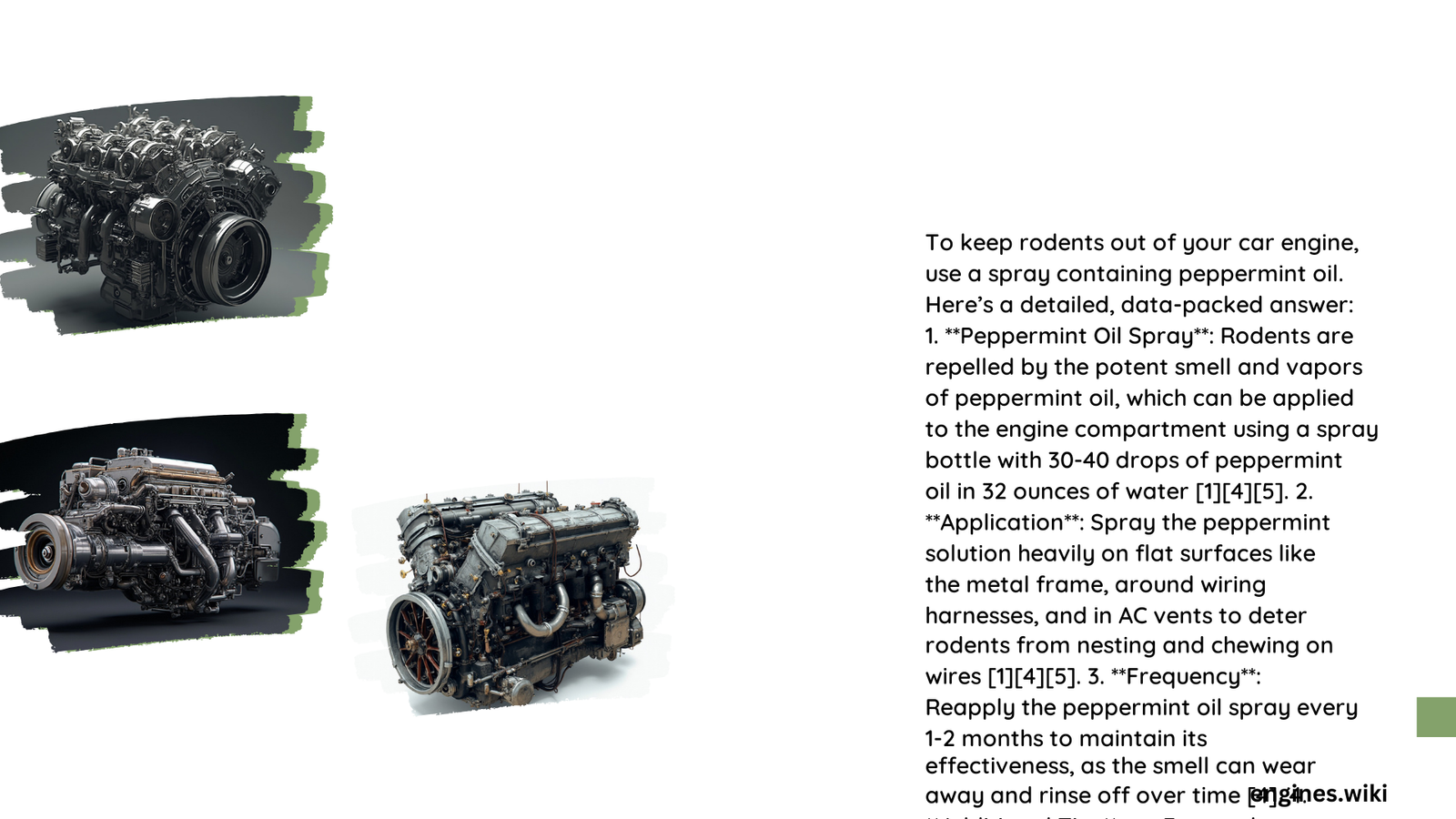Spray to keep rodents out of car engine is a crucial solution for vehicle owners facing rodent infestations. These specialized sprays use essential oils like peppermint and cinnamon or commercial formulations to repel mice and rats. They work by creating an unpleasant environment for rodents, deterring them from nesting in your engine compartment. Proper application and regular reapplication are key to maintaining effectiveness. This guide explores various spray options, their ingredients, application techniques, and tips for optimal use to protect your car’s engine from rodent damage.
What Are the Most Effective Ingredients in Rodent Repellent Sprays?
Rodent repellent sprays for car engines typically contain one or more of the following effective ingredients:
- Peppermint Oil
- Cinnamon Oil
- Capsaicin (from hot peppers)
- Citronella Oil
- Eucalyptus Oil
These essential oils are known for their strong scents and irritating properties that deter rodents. Peppermint oil, in particular, is highly effective due to its potent aroma that stings rodents’ nostrils and eyes.
How Do Commercial Rodent Repellent Sprays Compare?

Let’s compare some popular commercial rodent repellent sprays:
| Product | Main Ingredients | Effectiveness | Duration | Price Range |
|---|---|---|---|---|
| Vinevida Rodent Repellent | Peppermint, Cinnamon | High | Not specified | $15-$20 |
| 3M Rodent Repellent | Proprietary formula | Moderate | 60 days | $6-$10 |
| Tomcat Rodent Repellent | Essential oil blend | High | 30 days | $10-$15 |
Vinevida and Tomcat sprays focus on repelling rodents, while 3M’s product aims to make wiring less appealing to chew. Each has its strengths, so choose based on your specific needs and the severity of your rodent problem.
What Are the Best Natural Alternatives for Rodent Repellent Sprays?
For those preferring natural solutions, consider these DIY options:
- Peppermint Oil Spray
- Mix 20 drops of peppermint oil with water in a 32-ounce spray bottle
-
Spray around the engine compartment, avoiding electrical components
-
Cinnamon and Cayenne Pepper Spray
- Combine 1 tablespoon each of cinnamon and cayenne pepper with 2 cups of water
-
Shake well and spray in rodent-prone areas
-
Vinegar and Water Solution
- Mix equal parts white vinegar and water
- Apply to areas where rodents are likely to enter
These natural sprays can be effective but may require more frequent application than commercial products.
How Should You Apply Rodent Repellent Spray to Your Car Engine?
Proper application is crucial for the effectiveness of rodent repellent sprays. Follow these steps:
- Ensure the engine is cool and dry
- Clean the engine compartment of any debris or nesting materials
- Wear gloves and a mask for protection
- Spray the repellent around:
- Wheel wells
- Engine block
- Wiring harnesses (avoid direct contact with electrical connections)
- Flat surfaces where rodents might rest
- Pay special attention to entry points and dark corners
- Allow the spray to dry completely before starting the engine
Remember to reapply the spray according to the product’s instructions, typically every 30-60 days.
What Precautions Should You Take When Using Rodent Repellent Sprays?
When using rodent repellent sprays, keep these safety measures in mind:
- Always read and follow the manufacturer’s instructions
- Avoid spraying on hot engine parts or electrical components
- Use in a well-ventilated area to prevent inhalation of fumes
- Keep sprays away from children and pets
- Store sprays in a cool, dry place away from direct sunlight
- Wash hands thoroughly after application
- Do not use sprays near open flames or while smoking
How Can You Enhance the Effectiveness of Rodent Repellent Sprays?
To maximize the impact of rodent repellent sprays:
- Combine spray use with other deterrent methods:
- Install ultrasonic repellers in your garage
- Use rodent-proof mesh to cover potential entry points
-
Keep your garage and surrounding areas clean and free of food sources
-
Regularly inspect your vehicle for signs of rodent activity
- Park in well-lit areas when possible
- Consider using rodent-repellent tape on wiring harnesses
- Remove food sources from your vehicle and nearby areas
What Are Common Mistakes to Avoid When Using Rodent Repellent Sprays?
Avoid these common pitfalls when using rodent repellent sprays:
- Overapplying the spray, which can lead to:
- Waste of product
- Potential damage to engine components
-
Increased risk of inhalation
-
Neglecting to reapply as recommended
- Spraying on electrical connections or sensors
- Using sprays on a hot engine
- Relying solely on sprays without addressing other attractants
By avoiding these mistakes, you can ensure the safe and effective use of rodent repellent sprays.
How Often Should You Reapply Rodent Repellent Spray?
Reapplication frequency depends on the specific product:
- Commercial sprays like 3M: Every 60 days
- Natural peppermint oil sprays: Every 2-3 weeks
- Tomcat Rodent Repellent: Every 30 days
Factors affecting reapplication include:
– Weather conditions (rain can wash away sprays)
– Severity of rodent problem
– Vehicle usage and storage conditions
Always follow the manufacturer’s recommendations for best results.
By following this comprehensive guide, you can effectively use spray to keep rodents out of car engine, protecting your vehicle from costly damage and maintaining its performance. Remember to combine spray use with other preventive measures for the best protection against rodent infestations in your car engine.
References:
1. The Ultimate Guide to Best Rodent Repellents for Cars – VINEVIDA
2. Rat/Mouse/Rodent Repellent Spray For Your Car #3M #bitteR
3. How to EASILY Prevent Mice/Rats From Getting in Your Car/Engine …
